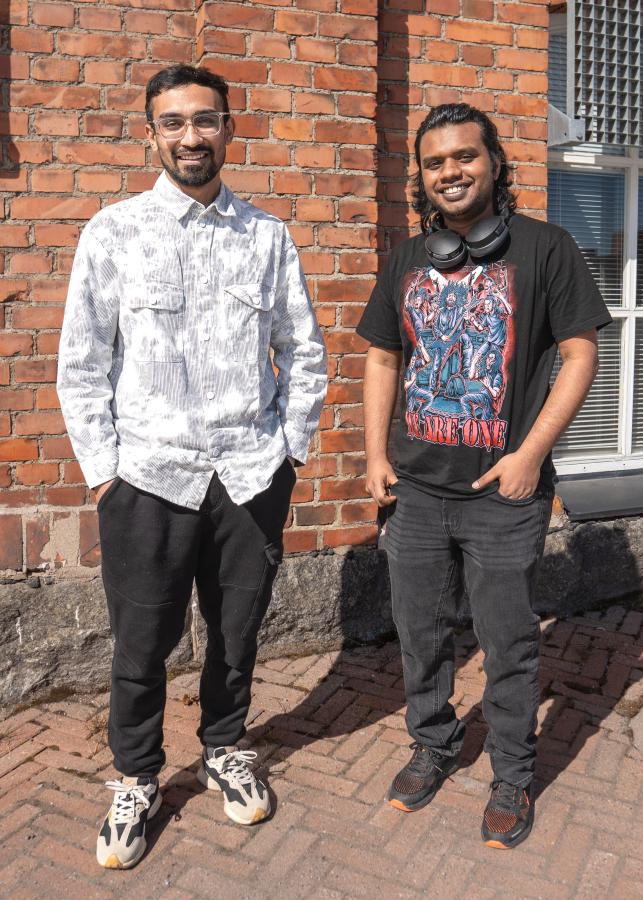Networking is surprisingly important in Finland – new programme helps international students connect with companies in Ostrobothnia
West Coast Gateway will help students to get to know Finnish working life, working culture and employers in the Ostrobothnia region right from the start of their studies. For employers, the programme will provide a low-threshold opportunity to learn about students' skills through mentoring, project work and internships.
– We want to ensure that students have the opportunity to meet employers in the Ostrobothnia region throughout their studies. This way, the employment opportunities in the region will become more familiar to them and their talent potential will not be lost elsewhere when they graduate, says Talent Hub Manager Hanna Turpeinen.
Every year, around 300 international Master's students start their studies at the University of Vaasa to deepen their expertise gained from previous studies and work experience. After completing two years of studies, most of them would like to stay in the Vaasa region to build their lives and careers. However, they are unsure about their employment opportunities in the region.
In recent years, the university and other stakeholders in the Vaasa region have taken many actions to support the employment of international talent. The novelty in the West Coast Gateway programme comes from its step-by-step approach, building up competences and networks from the start of studies, preparing students for the work life after graduation.
Finnish work culture and innovation projects
The new programme is based on good existing models and new experiments. One of the experiments this spring was a new working life course that combined innovation projects and work life knowledge. The pilot course was organised jointly by the University's career services and Demola Global company.
The work life course ran in parallel with Demola's innovation projects, where students solved cases in a cross-disciplinary way. Project themes were related to issues important for companies and employers, such as sustainability reporting, branding and energy storages.

– By working with Demola, we can provide students with business perspectives on work-life trends, says Malin Wälitalo-Palo, Specialist in Career Services.
In addition to practical project work, the students have been able to learn and reflect on Finnish working life and work culture and compare them with their previous experiences. Topics of the sessions have included for example Finnish leadership, job-seeking and Finnish language skills. In the final session, students heard experiences from an alumnus and greetings from the Chamber of Commerce of Ostrobothnia.
Networking is surprisingly important in Finland
This spring, 42 students took part in the pilot course. Shuvendu Shuvo Mallick and Abdullah Al Noman Chowdury have been pleased with the experience: it has opened their eyes to how to approach Finns both at work and in everyday life.
– The biggest take away from this programme was that I learned to be more broad. I learned that I have to get to know people before I explain more about myself to them, says Abdullah.
– I think it's not just about getting a job. It's about building ourselves better so that we can integrate into the Finnish working culture. I think it was really helpful to have our perspectives open a little bit like broader, says Shuvendu.
What has surprised both of them is how important networking and building relationships is when looking for a job in Finland. Getting to know people will make you feel more at home but it can also help you in finding a job.
– My expectation was that in Europe, employers would be strict in terms of skills and experiences. Now I find that I need to make connections, says Abdullah.
Another surprise is the Finnish culture of trust. It's good to be honest about your skills and it's important to stick to what you promise. You can even be honest about your mistakes.
– Finnish people take your word for it. If you have said that you know something, one day they could come and say, you know this, just do it, says Shuvendu.
All in all, the course has opened students' eyes to Finnish culture and working life. After the two-month programme, many of them have clearer vision of their career plans in Finland.
– The course has been incredibly successful. The discussions and reflections with the students on what is valuable in Finnish working life and culture and how it differs globally have been very rewarding. The students have told us that understanding Finland's background and history also helps them to understand the Finnish working culture and way of life, says Malin Wälitalo-Palo.
– The feedback from the students has been very positive and they have participated actively. The course has given the students the opportunity to ask about matters they wonder about or are puzzled by in Finnish working life. The concept was successful and useful for the students, and we will continue to develop it, says Hanna Turpeinen.

